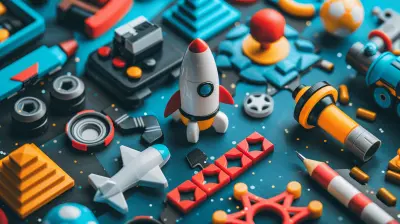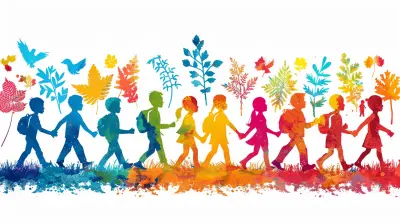Why Self-Assessment is Key to Developing Independent Learners
29 October 2025
Introduction
Have you ever wondered why some students seem to learn effortlessly while others struggle? The secret often lies in self-assessment. When learners take charge of evaluating their own progress, they develop critical thinking skills, self-awareness, and the ability to learn independently. But what exactly is self-assessment, and why is it essential for independent learning? Let’s break it down!

What is Self-Assessment?
Self-assessment is the process where students reflect on their own learning, identify their strengths and weaknesses, and set personal goals for improvement. It’s not just about grading yourself—it’s about understanding where you stand and what steps you need to take to improve.Think of it like a GPS for learning. If you don’t know your current location, how can you figure out the best route to your destination? Self-assessment helps learners find their academic starting point and chart a course for success.

How Self-Assessment Encourages Independent Learning
1. Develops a Growth Mindset
When students assess their own work, they shift their focus from “Did I get this right?” to “How can I improve?” This fosters a growth mindset—an attitude that values effort, persistence, and learning from mistakes. Instead of fearing failure, independent learners see it as a stepping stone to progress.2. Enhances Critical Thinking Skills
Self-assessment requires students to analyze their work objectively. They must ask themselves:- What did I do well?
- Where did I struggle?
- How can I improve next time?
By consistently answering these questions, students sharpen their critical thinking skills, making them better problem solvers and decision-makers.
3. Boosts Self-Motivation and Responsibility
When learners take an active role in evaluating their performance, they become more engaged in the learning process. They no longer rely solely on teachers for feedback; instead, they take responsibility for their own progress. This sense of ownership increases motivation and commitment to learning.4. Improves Goal-Setting Abilities
Independent learners don’t just aimlessly complete tasks—they set clear goals and work towards them systematically. Through self-assessment, students recognize which areas need improvement and create action plans to address them.For example, if a student struggles with writing essays, self-assessment can help them pinpoint specific issues like weak thesis statements or poor structure. Once identified, they can focus on refining those skills.
5. Encourages Reflection and Self-Awareness
Successful learning isn’t just about memorizing facts—it’s about understanding how you learn best. Self-assessment encourages students to reflect on their learning habits, strengths, and areas for growth.Are they better at visual learning or hands-on activities? Do they grasp concepts faster in group discussions or when studying alone? By recognizing these patterns, they can tailor their study methods for maximum effectiveness.

Practical Ways to Implement Self-Assessment
1. Use Checklists and Rubrics
A structured checklist or rubric helps students evaluate their work against specific criteria. For instance, in writing assignments, a rubric could include organization, clarity, grammar, and creativity.2. Journaling and Self-Reflection
Encouraging students to keep a learning journal helps them track their progress and reflect on what they’ve learned. Writing down challenges and achievements helps reinforce learning and promote self-awareness.3. Peer Reviews and Feedback
Sometimes, looking at someone else’s work can help students develop a better sense of quality and improvement. Engaging in peer assessments allows students to critique and learn from one another.4. Self-Questioning Techniques
Encourage students to ask themselves guiding questions, such as:- What did I learn from this task?
- What mistakes did I make, and how can I fix them?
- How does this connect to what I already know?
5. Use Technology Tools
There are plenty of apps and digital platforms that support self-assessment. Tools like Google Forms, Quizlet, and Kahoot allow students to test their knowledge and receive instant feedback.
Overcoming Common Challenges in Self-Assessment
While self-assessment is powerful, it’s not without challenges. Some students may struggle with self-criticism, while others might overestimate their abilities. Here’s how to tackle these issues:1. Fear of Being Too Harsh or Too Lenient
Some students may be overly critical of their work, while others might give themselves too much credit. Teachers can help by providing clear guidelines and encouraging honest, balanced evaluations. Learning to assess oneself accurately takes practice!2. Lack of Confidence
Students who doubt their abilities may struggle with self-assessment. Encouraging a supportive learning environment where mistakes are seen as learning opportunities can boost confidence.3. Unclear Self-Assessment Goals
Without clear objectives, self-assessment can feel vague or pointless. Ensure students understand what they are evaluating and why it matters. Providing structured reflection prompts can make the process more effective.The Role of Teachers and Parents in Promoting Self-Assessment
Although self-assessment is a personal process, teachers and parents play a crucial role in guiding students.- Teachers can introduce self-assessment strategies, provide rubrics, and encourage students to reflect on their learning regularly.
- Parents can support self-assessment at home by asking their children about their learning experiences, helping them set goals, and celebrating progress.
When students see self-assessment as a natural part of learning, they develop the independence needed to thrive both academically and in life.
Conclusion
Self-assessment isn't just a skill—it’s a mindset that transforms learners into independent thinkers. By reflecting on their progress, setting goals, and taking ownership of their learning, students develop the confidence and self-discipline needed for lifelong success.So next time you're working on a project or studying for an exam, take a step back and assess yourself. What are you doing well? What can you improve? By making self-assessment a habit, you’ll become a smarter, more independent learner.
all images in this post were generated using AI tools
Category:
Self AssessmentAuthor:

Anita Harmon
Discussion
rate this article
1 comments
Jude Webster
Self-assessment empowers learners to take ownership of their progress, fostering independence and growth.
October 30, 2025 at 5:10 AM

Anita Harmon
Thank you! I completely agree—self-assessment is crucial for fostering learner autonomy and promoting personal growth.


